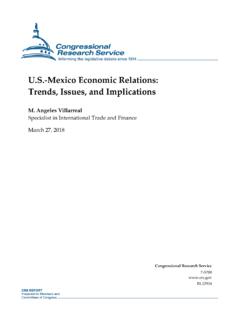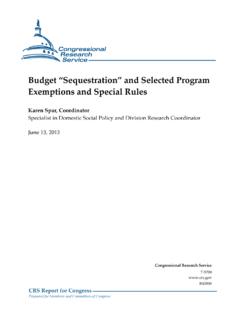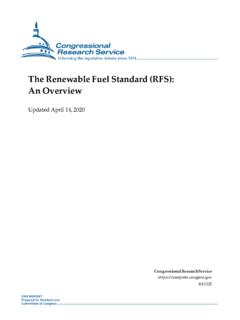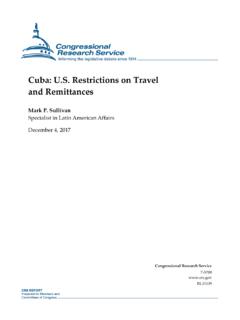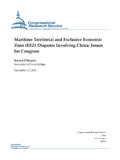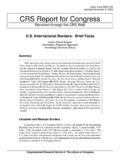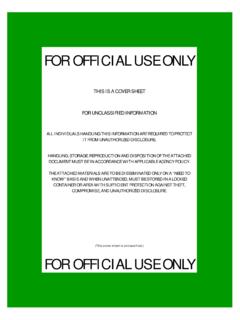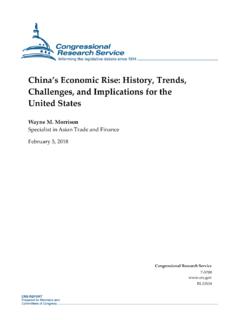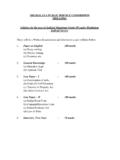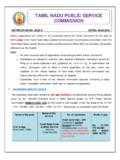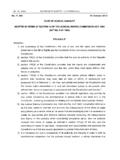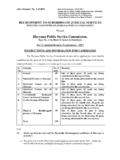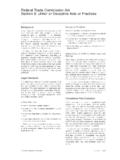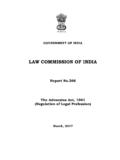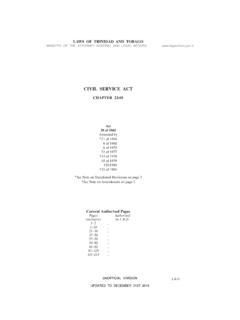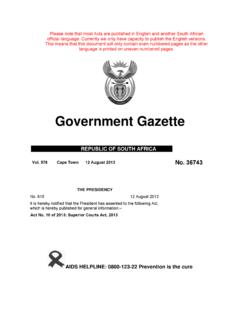Transcription of An Introduction to Judicial Review of Federal Agency Action
1 An Introduction to Judicial Review of Federal Agency Action Jared P. Cole Legislative Attorney December 7, 2016 Congressional Research Service 7-5700 R44699 An Introduction to Judicial Review of Agency Action Congressional Research Service Summary The Constitution vests the Judicial power in the Supreme Court and any inferior courts established by Congress, limiting the power of Federal courts to the context of cases or controversies. Pursuant to constitutional and statutory requirements, courts may hear challenges to the actions of Federal agencies in certain situations. This report offers a brief overview of important considerations when individuals bring a lawsuit in Federal court to challenge Agency actions, with a particular focus on the type of Review authorized by the Administrative Procedure Act (APA), perhaps the most prominent modern vehicle for challenging the actions of a Federal Agency .
2 Whether Judicial Review of Agency Action is available in Federal court turns on a number of factors. Courts must possess statutory jurisdiction to adjudicate a lawsuit, and plaintiffs must generally rely on a cause of Action that allows a court to grant legal relief. Disputes must also present cases or controversies that satisfy the requirements of Article III of the Constitution. Finally, a suit must be presented to a court at the proper time for Judicial Review . The APA directs reviewing courts to compel Agency Action unlawfully withheld or unreasonably delayed and to hold unlawful and set aside Agency Action , findings, and conclusions that violate the law or are otherwise arbitrary and capricious. This Review is limited, however, to final Agency Action that is not precluded from Review by another statute or legally committed to the Agency s discretion. Pursuant to this mandate, courts are authorized to Review Agency Action in a number of contexts.
3 First, courts will examine the statutory authority for an Agency s Action and will invalidate Agency choices that exceed these limits. In addition, a court may examine an Agency s discretionary decisions, or discrete actions with legal consequences for the public. Finally, courts may also Review an Agency s compliance with statutory procedural requirements, such as the notice-and-comment rulemaking procedures imposed by the APA. This report provides a broad overview of the issues that may be relevant to any number of present and future challenges to Agency Action in Federal court. An Introduction to Judicial Review of Agency Action Congressional Research Service Contents Requirements for Judicial Review .. 2 Statutory Jurisdiction .. 3 Subject Matter Jurisdiction .. 3 Sovereign 4 Cause of Action .. 5 Constitutional and Prudential Limits on Federal Court Jurisdiction .. 6 Standing.
4 6 Timing of Judicial Review .. 7 The Scope of Review Under the Administrative Procedure Act .. 9 Reviewability of Agency Action .. 9 Limits of Review Under the APA .. 10 What Is an Agency ? .. 10 What Constitutes Agency Action ? .. 10 Final Agency Action .. 11 Statutory Preclusion of Review .. 11 Committed to Agency Discretion .. 12 Review of Statutory Issues .. 12 Chevron Deference .. 13 Limits to Chevron Deference .. 14 Review of Agency Interpretations of Regulations .. 16 Judicial Review of Agency Factual Determinations and Discretionary Decisions .. 18 Review of Compliance with Procedural Requirements .. 21 Conclusion .. 24 Tables Table 1. Types of Agency Actions .. 22 Contacts Author Contact Information .. 25 An Introduction to Judicial Review of Agency Action Congressional Research Service 1 ongress has created numerous Federal agencies charged with carrying out a broad array of delegated statutory Agencies administer their delegated authority in a variety of ways, including by promulgating rules and regulations that bind the public,2 advising regulated parties of an Agency s enforcement priorities via guidance documents,3 bringing enforcement actions against private individuals or corporations for violation of a statute or regulation,4 and determining whether to grant a benefit5 or These Agency actions, in turn, often generate questions about the legitimacy of an Agency s decision.
5 Individuals affected by an Agency decision can sometimes challenge that Action in Federal court as violating a legal requirement. The Constitution vests the Judicial power in the Supreme Court and any inferior courts established by Congress,7 limiting the power of Federal courts to the context of a of a case or controversy. 8 Pursuant to this authority, Congress has established Federal courts below the Supreme Court of the United States to hear a variety of cases, both criminal and Federal legislation authorizes courts to adjudicate challenges to actions taken by government officials and agencies in a variety of Federal courts are, however, courts of limited jurisdiction they must adhere to limits placed on their authority by Congress and the The circumstances under which a Federal court will Review the actions of a government Agency or official thus involve complicated questions of statutory and constitutional law.
6 This report offers a brief overview of some of the most important issues arising when individuals bring suit in Federal court to challenge Agency actions. The Administrative Procedure Act (APA) is perhaps the most prominent modern vehicle for challenging the actions of a Federal Enacted in 1946 following the New Deal era, during 1 The Constitution creates the offices of the President and Vice President, CONST. art. II, 1, the Congress, id. art. I, 1, and the Supreme Court, id. art. III, 1. Congress is authorized [t]o make all Laws which shall be necessary and proper for carrying into Execution the authority bestowed on these entities. id. art. I, 8, cl. 18. Pursuant to this power, Congress has established Federal offices and agencies within the executive, legislative, and Judicial branches. See CRS Report R43562, Administrative Law Primer: Statutory Definitions of Agency and Characteristics of Agency Independence, by Jared P.
7 Cole and Daniel T. Shedd. 2 See CRS Report RL32240, The Federal Rulemaking Process: An Overview, coordinated by Maeve P. Carey. 3 See CRS Report R44468, General Policy Statements: Legal Overview, by Jared P. Cole and Todd Garvey. 4 See, , Pierce v. SEC, 786 1027, 1031 ( Cir. 2015) (denying an individual s petition for Review of enforcement actions brought by the Securities and Exchange Commission). 5 See, , 42 301 et seq. (authorizing the Social Security Administration to pay benefits to certain disabled individuals). 6 See 5 558 (imposing certain requirements on agencies when reviewing applications for a license). 7 See CONST. art. III, 1 ( The Judicial Power of the United States, shall be vested in one supreme Court, and in such inferior Courts as the Congress may from time to time ordain and establish. ); id. art. I, 8, cl. 9 (authorizing Congress [t]o constitute Tribunals inferior to the [S]upreme Court ).
8 8 Id. art. III, 2, cl. 1. 9 See Judiciary Act of 1789, ch. 20, 1 Stat. 73, 73; 28 41 (establishing circuit courts); id. ch. 5 (establishing district courts); id. 1331 (providing district courts with original jurisdiction of all civil actions arising under the Constitution, laws, or treaties of the United States. ); id. 1332 (providing district courts with original jurisdiction of all civil actions where the matter in controversy exceeds the sum or value of $75,000 .. and is between diverse parties). 10 See infra Requirements for Judicial Review . 11 See Owen Equip. & Erection Co. v. Kroger, 437 365, 374 (1978) ( It is a fundamental precept that Federal courts are courts of limited jurisdiction. The limits upon Federal jurisdiction, whether imposed by the Constitution or by Congress, must be neither disregarded nor evaded. ). 12 5 551 et seq. C An Introduction to Judicial Review of Agency Action Congressional Research Service 2 which the size of the administrative state was expanded, the statute represents the first government-wide attempt to systematize requirements on the actions of Federal The APA functions as the most prominent authorization of Judicial Review of Agency Action , including for Agency compliance with substantive legal requirements such as an Agency s organic, or authorizing, In addition, the APA imposes various procedural requirements on Federal agencies and authorizes courts to Review Agency s compliance with these requirements.
9 Accordingly, the focus of this report is largely centered on Judicial Review of Agency actions under the APA. The report opens with a discussion of the circumstances in which Federal courts are empowered to Review Agency actions15 and follows with a look at the scope of Review authorized by the It then continues by describing the mechanics of a Federal court s Review of an Agency s statutory authority,17 as well as the standards employed in the Review of an Agency s discretionary The report concludes with a brief examination of Judicial Review of Agency compliance with statutorily prescribed procedural Requirements for Judicial Review Not every Agency Action is necessarily subject to Judicial Review . Whether Judicial Review of Agency Action is available in Federal court turns on a number of factors, including constitutional,20 prudential,21 and statutory22 considerations.
10 Courts must possess statutory jurisdiction to adjudicate a lawsuit, and plaintiffs must generally rely on a cause of Action that allows a court to grant legal relief. Disputes must also present cases or controversies that satisfy the 13 GARY LAWSON, Federal ADMINISTRATIVE LAW 202 (2009). 14 Drake v. FAA, 291 59, 62 ( Cir. 2002) (describing the scope of Judicial Review permitted by the Agency s organic statute ); see generally Kathryn E. Kovacs, Superstatute Theory and Administrative Common Law, 90 IND. 1207 (2015) ( The APA has taken on quasi-constitutional status. ). 15 See infra Requirements for Judicial Review . 16 See infra The Scope of Review Under the Administrative Procedure Act. 17 See infra Review of Statutory Issues. 18 See infra Judicial Review of Agency Factual Determinations and Discretionary Decisions.


